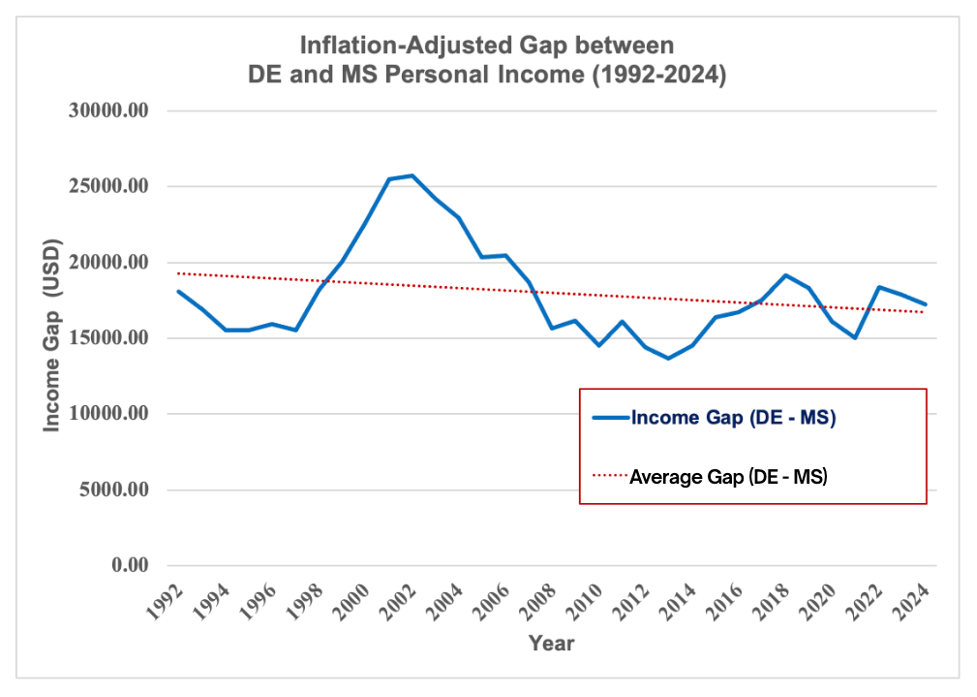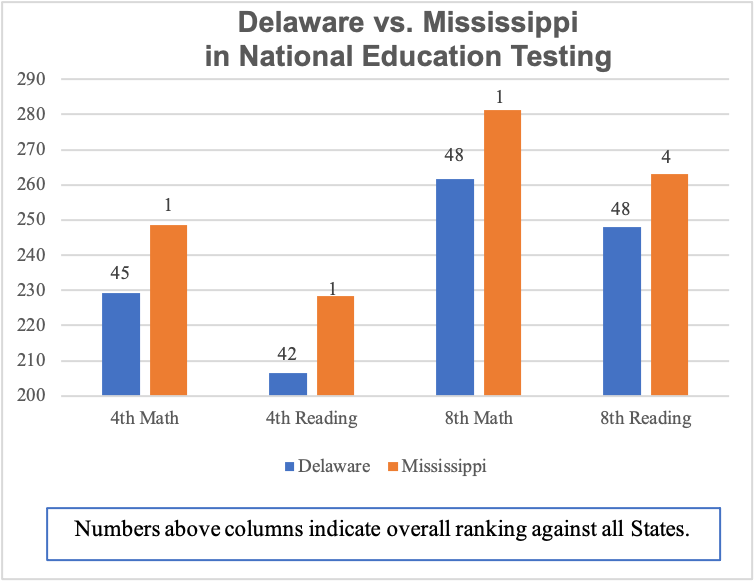
Delaware Slipping, Mississippi Rising: A Tale of Two States Changing Places
For decades, Delaware enjoyed a reputation as a high-performing state-economically sound, educationally competitive, and relatively stable. In contrast, Mississippi was often portrayed as lagging behind the rest of the country on nearly every metric. However, recent data tells a different story: Mississippi is making notable gains, while Delaware is losing ground. The economic and educational gap between the two has narrowed or reversed.
A Shrinking Economic Lead
In 1992, Delaware's personal income per capita was 53.3% higher than Mississippi's, reflecting an inflation-adjusted gap of more than $18,000. By 2024, that gap narrowed to just $17,265, with Delaware's income now only 33.2% higher. While this still represents a healthy margin, the trend is clear: the gap is shrinking. Delaware has lost ground, while Mississippi has slowly gained.
Why does this matter? Because per capita income is a key indicator of a state's economic performance. Delaware's declining lead-down more than 30% from its peak-signals that its growth is not keeping pace with its former strength or Mississippi's improvements.
This shift is even more striking within the context of current tax policy. Mississippi has recently enacted significant income tax cuts as part of a long-term strategy to reduce the tax burden on its residents and stimulate growth. Meanwhile, Delaware is actively considering raising income taxes, a move that could further dampen competitiveness and deter investment.

(Graph source: St. Louis Federal Reserve and author calculations.)
Volatility vs. Steadiness
The differences in economic performance involve not only levels but also consistency. From 2005 to 2024, Delaware's quarterly growth rates have exhibited greater volatility, with a standard deviation of 2.38% compared to Mississippi's more modest 1.73%. While that may not seem significant, in economic terms, it suggests Mississippi's more diversified economy; some areas thrive even when others do not.
Education: A Stunning Reversal
Perhaps the most striking shift is in education. Once a beacon of strong public schools, Delaware has experienced a sharp decline in educational outcomes, particularly when adjusted for student demographics. The 2024 National Assessment of Educational Progress (NAEP), modified by the Urban Institute to account for factors such as income level, race, special education status, and more, presents a grim picture.
Mississippi now ranks first in three of four core academic categories: fourth-grade math, fourth-grade reading, and eighth-grade math. Additionally, in eighth-grade reading, Mississippi holds the fourth rank. In contrast, Delaware ranks in the bottom 10 in all categories, including 48th in both eighth-grade math and reading.

(Graph source: Urban Institute)
Mississippi's climb results from targeted reforms, high standards, and consistent focus. Delaware's decline suggests a systemic failure to meet modern educational challenges.
What's Behind the Shift?
Economically, Mississippi has emphasized diversifying its economy beyond traditional industries and enhancing access to workforce development programs. Meanwhile, Delaware, once a magnet for business investment, has shifted its focus towards government growth through mandates in energy, small business operations and increased regulations.
Mississippi's education turnaround has not happened by chance. Over the past decade, the state has instituted rigorous early literacy programs, raised expectations for teachers and students, and committed to consistent policy implementation. Meanwhile, Delaware has struggled with ineffective leadership, consistently poor policy and a lack of vision.
Conclusion: A Wake-Up Call for Delaware
The numbers tell a compelling story. Mississippi, long seen as a laggard, is now on the rise-economically and educationally. Delaware, once a model of performance, is slipping.
This shift should serve as a wake-up call to policymakers. To stay competitive, the state must reassess its policies, stabilize its economic development strategies and invest in effective education reforms.
Mississippi's rise is not just a feel-good story, it's proof that with clear goals and consistent execution, a state can overcome entrenched challenges. Delaware's decline, on the other hand, is a cautionary tale about the dangers of complacency and refusal to modernize.